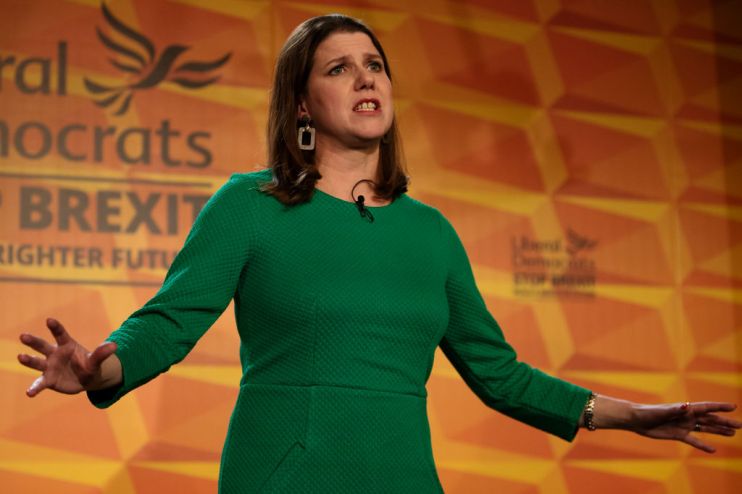The hubristic Lib Dems flew too close to the electoral sun

Of all the Greek myths, the most famous is probably the story of Icarus, the boy who flew too close to the sun.
Gifted with ingeniously crafted wings, he was warned that flying too high would risk melting the wax that held them together. Reckless and overconfident, Icarus found his wings disintegrating mid-air, and met his downfall in a predictable pile of wax and feathers.
It is difficult to recall this myth without thinking about the Liberal Democrats — and not just because their logo is a golden bird in flight.
The party of Remain has not been having a good week — or, indeed, a good campaign. From polling at lofty heights of 23 per cent in September (at one point overtaking Labour), enthusiasm has ebbed, and it is now down to 15 per cent.
Worse than the polls, despite a flurry of righteous indignation and an ill-fated court case, Jo Swinson was denied the chance to stand next to Boris Johnson and Jeremy Corbyn in Tuesday’s leaders debate. The message was clear: these are the people who have a chance of becoming Prime Minister, and the Lib Dem leader is not one of them.
This is a problem, because up until now, the party has been trying to keep up the illusion that it stands a genuine chance not just of doing well enough in the General Election to wield real influence, but of winning outright.
Such boundless optimism borders on hubris — the last time a party other than Labour or the Conservatives won a majority was 1906.
Nonetheless, encouraged by increasing Brexit fatigue among the public and dissatisfaction with both the major party leaders, the Lib Dems made a calculation.
Everyone wants the endless Brexit saga to be resolved so the country can move on to important things like the NHS and housing and education. For all that the Conservatives have been chanting the mantra “Get Brexit done”, Boris Johnson’s new deal would still set the country on course for months if not years of protracted trade talks, while Labour’s policy of a renegotiation followed by another referendum would mean dragging out the interminable EU debate even longer.
In contrast, the deceptive simplicity of the Lib Dem policy — revoke Article 50 on day one, possibly by email, and pretend that the Brexit vote never happened — must have seemed like campaign gold.
The Lib Dems were also no doubt overexcited about their new leader, who is not only female but, at age 39, almost young enough to be a millennial. That explains the presidential strategy, with all the branding centred on Swinson herself and breathless talk about the possibility of her becoming Prime Minister, along with the hopeful insistence that “hundreds of seats are in play” for the party.
As a reminder, the Lib Dems won 12 seats in the 2017 election.
This campaign was always going to fall apart at the seams.
For a start, while Remain-leaning voters may wish that Brexit could be cancelled outright, disregarding a referendum without even going back to the people is a radical and counter-intuitive move for a party with “Democrats” in the name.
Moreover, British politics is cruel and unforgiving. For all that some might find Swinson’s youth and energy appealing (it’s refreshing to have at least one party leader who is clear-sighted and unashamed about their past drug use), our electoral system does not work the way that the Lib Dems seem to think it does.
So while Lib Dem HQ might have drunk the Kool-Aid and seemed genuinely convinced that Swinson could be Prime Minister, the rest of the country wasn’t ever going to be fooled. A good result for the Lib Dems would be winning enough seats to join a coalition, and influencing Brexit that way.
Too late, the party seems to have realised this and is trying to pivot. Earlier this week, deputy leader Ed Davey said that the Lib Dems could prevent the Conservatives from winning a majority “and through that we can stop Brexit”.
The new idea is that another hung parliament with a larger Lib Dem contingent would be enough to pressure the governing party into holding a second referendum — which was, until very recently, their stated Brexit policy.
Had this been the strategy from the beginning (focus on Lib Dem-Tory marginals, aim for a hung parliament, and push for a people’s vote afterwards), it could well have worked. Instead, the party overreached, making the controversial decision to go after Labour just as hard and try to promote Swinson as an alternative Prime Minister.
The bizarre blunder in Canterbury, where the Lib Dem candidate stood down to give the incumbent anti-Brexit Labour MP a clear run, only to have the party immediately replace him, belied the myth of the Remain alliance. For all their talk of putting the country first and stopping Brexit at all costs, the Lib Dems have been revealed to be just as self-interested and power-hungry as everyone else.
And so the gloss is beginning to chip off. Swinson might be a good junior coalition partner, but most of the electorate knew from the start that she was never in a position to run for Prime Minister. By pretending otherwise, she has come across as at best naive, at worst delusional.
Spread too thin and aiming too high, the sunlit-tinted wings of the Liberal Democrats are falling apart, and with three weeks to go until polling day, the party is crashing back down to earth.
Main image credit: Getty